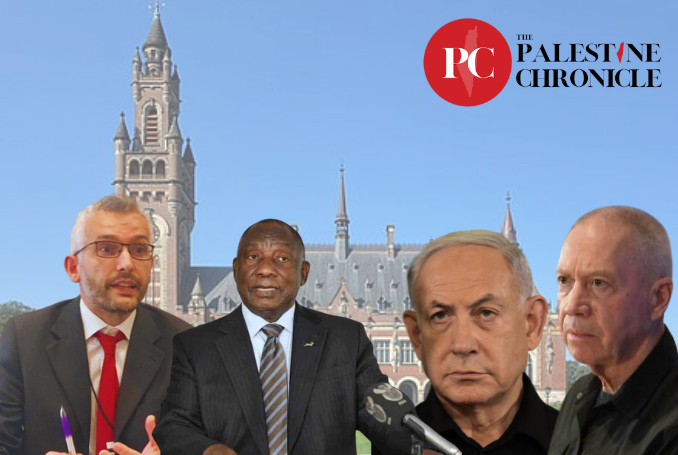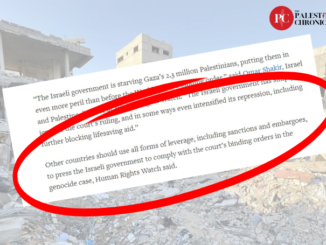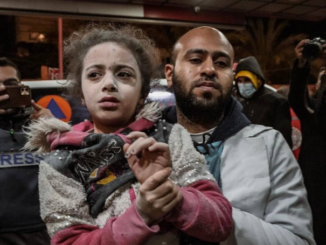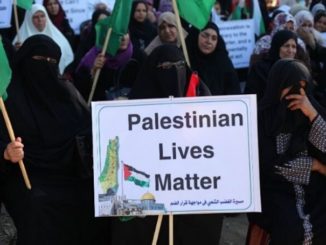
On January 11 and 12, the International Court of Justice in The Hague will begin a procedure requested by the South African government to look into an alleged Israeli genocide in the Gaza Strip.
In a statement on December 29, the ICJ said that South Africa had requested the Court’s intervention to examine evidence of “alleged violations by Israel of its obligations under the Convention on the Prevention and Punishment of the Crime of Genocide in relation to Palestinians in the Gaza Strip”.
Reports indicate that Israel has agreed to participate in the South Africa case by offering its counterclaim.
To understand the intricacies of this case, and its possible legal and political repercussions on the ongoing Israeli war on the Gaza Strip, we asked Dr. Triestino Mariniello to break down the story for us.
Dr. Mariniello is Professor of Law at Liverpool John Moores University, and a member of the legal team for Gaza victims at the International Criminal Court (ICC).
Why is This Important?
South Africa’s decision is a historic one. For the first time, a country has decided to file a case against Israel before the International Court of Justice over genocide.
However, this is not the first legal procedure against Israel at the ICJ. Indeed, in 2004, the court rendered an advisory opinion in the case concerning the ‘Legal Consequences of the Construction of a Wall in the Occupied Palestinian Territory’. Despite the ICJ’s decision that the construction of the Israeli Wall was contrary to international law, Israel still did not abide by the legal opinion.
It will be interesting to see whether other states will join South Africa’s case, as happened with the Ukrainian case against Russia.
Israel has reportedly decided to appear before the Court to counter the claim made in the South African case. This Israeli appearance cannot be taken for granted. But if news reports are confirmed, and Israel does indeed appear before the ICJ, this would also imply the possibility for other countries to join Tel Aviv’s counterclaims.
There is still debate about whether the United States will technically be able to join Israel’s counterclaim or not. When it ratified the Genocide Convention in 1948, the US expressed a reservation on Article IX. Therefore, since the procedure was activated under Article IX, this could potentially prevent the US from joining the Israeli case.
What is the ICJ?
The ICJ is the judicial organ of the United Nations, and it was established in June 1945 by the UN charter to settle the disputes between states.
Unlike the International Criminal Court (ICC), the ICJ addresses issues of state responsibility, not of individual criminal responsibility. In this case, Israel, like all other states, has the duty to prevent genocide under the 1948 Genocide Convention, which has been ratified or acceded to by 153 states.
On December 29, South Africa instituted the procedure seeking to found – establish – the Court’s jurisdiction on Article IX of the Convention
Can Israel’s actions in Gaza fall under the legal definition of genocide?
A genocide is the intentional destruction of a protected group in whole or in part.
Generally speaking, the most difficult thing to prove is the genocidal intent. In this case, however, there are dozens of genocidal statements made by Israeli officials, which were included in the file South Africa submitted to the Court.
For example, the file includes Israeli Prime Minister Benjamin Netanyahu’s speech on October 29, invoking the Amalek theory to justify the killing of Palestinians in Gaza, as well as Israeli Defense Minister Yoav Gallant’s statements.
Aside from these statements, we have witnessed the practices of mass killing and restriction of basic conditions of life, such as starvation, destruction of Gaza’s healthcare system, forced displacement and so on.
The South African case seems like a strong case, and we would not expect less from a very well-respected legal team, led by former UN Special Rapporteur John Dugard.
What are the ‘provisional measures’ specifically requested by the South Africa legal team?
South Africa’s application requests the court to indicate provisional measures to “protect against further, severe and irreparable harm to the rights of the Palestinian people” under the Convention.
Therefore, the Court is not asked to judge whether a state is committing the act of genocide. It is sufficient to prove that there is a risk of genocide and therefore that the acts carried out by Israel could fall into the category of genocide and that Palestinians are at risk of being subjected to genocide.
In this case, the court would issue ‘provisional measures’. They are binding and they are aimed at the protection of the human rights of Palestinians, including the cessation of fire.
Israeli Officials Fear ICJ Could Charge Israel with Genocide in Gaza – Reports
Is the decision binding?
The Court’s decision is binding.
However, the enforcement of the decision is a political decision made by the countries. However, it is legally binding for each and every member state of the genocide convention. Therefore, every state would be legally forced to respect the Court’s decision.
Generally speaking, the decision is not implemented by the UN Security Council. But if there was a resolution on a possible ceasefire, it would be interesting to see how the countries, and in particular the United States, would behave.
It would also be interesting to see how the ICC prosecutor would proceed with increasing demands of holding alleged Israeli war criminals accountable.
Other countries could launch procedures against the Israeli authorities.
The impact of all of this would surely be very strong.
What is the timeframe of the Court’s decision?
This is an urgent procedure, so according to the Court’s chart, it has a priority above all other files.
In fact, the Court has already scheduled the first hearings for the 11th and 12th of January.
(The Palestine Chronicle)








